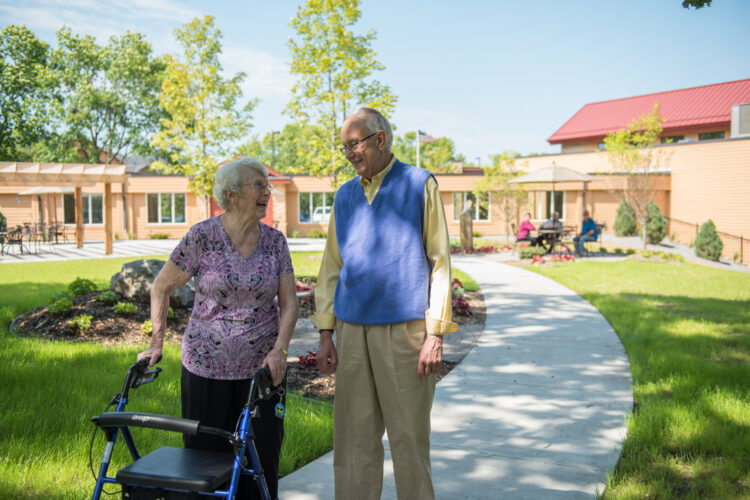It is a bitter truth of life that people grow old, and with advanced years comes a varied set of disabilities. In the present day world and time, as parents grow older, children get busier. Hence people in their sixties, seventies, and eighties are looking forward to the idea of assisted living.
An assisted living center may be a building, a residential society, or even a shared apartment where older adults who need varying degrees of assistance with their daily lives are taken care of.
There are numerous assisted living centers spread across the country that provide such facilities for the elders. For instance, graceseniorcommunity.com provides details about assisted living eagle idaho.
When Does Someone Need Assisted Living
Deciding if and when someone needs assisted living is the most crucial question to be answered before one gets into the nitty-gritty of deciding, which assisted living option will be the best for one’s parents.
There are multiple signs that one requires assisted living, like if people need help with their regular meals or if they forget to take their prescription medicine on time, or if even basic personal care activities like bathing are tiring for someone.
Apart from these reasons, sometimes, the sheer loneliness of elderly adults makes assisted living an imperative. With the death of a spouse or when children migrate to other cities for professional reasons, people might go for assisted living even when they do not suffer any bodily disability.

6 Steps To Take When Your Parents Need Assisted Living
1. Remove The Negative Idea Of Parents About Assisted Living
Generally, aged people like to stay the rest of their life in their own homes. They also love the status quo and feel hesitant to settle in a new environment. Many aged parents consider themselves able and independent and have a taboo toward assisted living. Children too are shy to raise the issue of their good intention to arrange assisted living life for their parents.
In such a situation the first thing is to talk freely and frankly with the parents. All children should sit together with their parents, and explain to them how much they care for them and it would be good for them to settle at the assisted living center. They should get them a feel of assisted living centers by arranging for parents to visit there to see the environment there and have talks with staff and residents of the center.
2. The Cost Involved
These assisted living centers are usually quite expensive. This is because they provide round-the-clock care, recreational facilities, and also security to the elders. However, in some cases, the cost may escalate highly as time passes, after the aged person gets admitted to the assisted living center.
Hence, it is essential to do a background check and to talk to other people who have used their facilities before to guard against unexpected fluctuations in the costs involved. Also, if the budget falls short, one can seek help from Government organizations and other charitable institutions that often provide funding for such noble causes.

3. Facilities Provided at assisted living centers
This would include doing a thorough check on all the things your parents would require on a day-to-day basis. Food and medical facilities would be the most important things to consider. The variety of food, the hygiene, the services from staff, recreational and socialization opportunities, etcetera, need to be inquired about. After food, the next thing would be to find out if they have a doctor and nurses on board.
Once basic requirements are taken care of, the recreational facilities organized by the assisted living center should also be considered, after all, many elders go to these centers when they are in dire need of company in their lives.
4. Terms Of The Contract
Care should be exercised while negotiating the terms and conditions of the contract when one decides to sign one with these centers. The contract should include terms and conditions that might arise when the aged person is staying at the center.
The contract should talk about the visiting hours for meeting one’s parents. It should also discuss possible situations if an older adult refuses to cooperate with the staff or if they want to return to their homes before the term of the contract has ended.
Addressing such concerns is essential because an elder person is often not responsive to change and finds it difficult to adjust to new rules. In such situations, they might throw tantrums. It is necessary that the assisted living center treats the adult responsibly if and when such a situation arises.
Also, in such legal matters, an attorney must be consulted for advice, since legal papers usually contain legal jargon, that is beyond the capacity of the commoner to comprehend.

5. Legality Of The Center
The legal status of the center is an important precautional step to take. When one trusts a center for caring for their parents, one should check whether the residences provided are bought and constructed legally. Then one might want to check if the center is legally registered and follows all the Government norms laid out for such organizations.
6. Caring Staff
This is probably the most important point when choosing an assisted living center. This is because no matter how good the facilities are, the staff is the ones who are going to provide all the services.
Right from the nurses to assistants to therapists to servers it is crucial that all staff members have no criminal background, they have the requisite educational and professional training required for their jobs and most importantly they are empathetic towards the elderly.
Even before a final decision is made the parents should meet and become used to the caregivers. This will go a long way in ensuring that the stay is peaceful and enjoyable for both the occupant and the staff.

Conclusion
Deciding if parents need assisted living and which center to send them to can be life-changing decisions that one makes. Hence it is very important that the decisions are not taken in haste, even if it takes time; all the inquiries must be made, and the details provided should be cross-verified.
The decision should be consultative both parents and the children should sit together and discuss all the pros and cons before making this decision. Arriving at a consensus is essential because even if one stakeholder is not on the same page, it can lead to a lot of turmoil, not only emotional but also legal.








